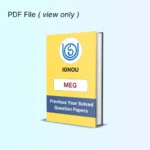MEG-15 Block 6 Summary | Literature and Culture: Exchanges
- Last Updated On October 20, 2025
Table of Contents
Here you will get the detailed summary of IGNOU MEG 15 Block 6 – Literature and Culture: Exchanges and Negotiations-1.
We have provided the summary of all units starting from unit 1 to unit 3.
Unit 1 – Telling and Retelling
Unit 1 of IGNOU MEG-15 Block 6 focuses on exploring the concept of telling and retelling as a continuous cultural and literary process. The unit discusses how stories are not static but are recreated across generations, languages, and media. Each retelling reflects the concerns, values, and imagination of its time, showing how literature evolves through reinterpretation.
The unit emphasizes that retelling is not mere repetition but a creative act of transformation. It allows authors to question existing meanings, introduce new perspectives, or adapt stories to different audiences. From oral traditions to modern adaptations, retellings keep narratives alive and relevant. The comparative approach highlights how storytelling becomes a site of cultural negotiation, where myths, legends, and historical events are reshaped to express contemporary truths.
Unit 2 – Retellings of Mahabharata
Unit 2 of IGNOU MEG-15 Block 6 focuses on the various retellings of the Mahabharata, one of the foundational epics of Indian civilization. The unit shows how this vast narrative has been interpreted, adapted, and reimagined across centuries in multiple languages, regions, and artistic forms.
Different retellings — from Sanskrit and regional versions to modern novels, plays, and films — reflect diverse worldviews. Each version emphasizes certain characters or moral dilemmas differently, revealing the adaptability of the epic to various social and historical contexts. For instance, modern writers have retold the Mahabharata from feminist, subaltern, or psychological perspectives to challenge traditional readings.
The unit underlines that the Mahabharata is not a fixed text but a living cultural narrative, constantly reinvented to address new realities. Comparative analysis of these retellings demonstrates how the same story can generate multiple meanings, illustrating the dynamic relationship between literature, culture, and interpretation.
Unit 3 – Dharamvir Bharati’s Verse Play Andha Yug
Unit 3 of IGNOU MEG-15 Block 6 focuses on Dharamvir Bharati’s verse play Andha Yug, a modern retelling of the Mahabharata set in the aftermath of the Kurukshetra war. The unit analyzes how Bharati uses the ancient epic to comment on the moral and political crisis of post-Partition India.
Andha Yug (The Age of Blindness) portrays a world devastated by war, where moral blindness leads to destruction and despair. The characters, including Dhritarashtra, Gandhari, Ashwatthama, and Krishna, become symbols of spiritual decay and ethical paralysis. Through their dialogues, Bharati reflects on the futility of revenge, the loss of dharma, and the urgent need for self-awareness and compassion.
The unit interprets the play as both a reinterpretation of myth and a critique of modern violence. By transforming an ancient narrative into a contemporary allegory, Bharati demonstrates how retelling can serve as moral inquiry and cultural reflection. Andha Yug thus becomes a timeless exploration of human weakness, responsibility, and the possibility of redemption.
